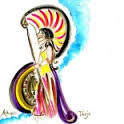Wednesday, 30th July 2008
Wherever Maltese are found
The grievance culture follows;
We are wont to protest
As if there’s no tomorrow.
We complain when it’s sunny;
We object when it’s not
We find fault when it’s freezing
We grouse when it is hot.
We gripe in morns and evenings
We whinge day in and out
We bellyache in cities…
In our villages and towns
We moan about the neighbours,
Our relatives and friends
We chunter about in-laws,
And the law of the land.
We beef at the high prices
But we frown when things are cheap;
Standing in queues annoys us…
But the fast life makes us weep…
This poem, dated 1976, fell out from between the pages of The Complete Works of Geoffrey Chaucer when I was looking for a quote for another feature. I must have written it in a moment of boredom during an English Literature lesson, and then forgotten all about it.
I cringe at it amateurishness – in fact, I grumble, too – when I see how it fails to scan properly, but the message is clear. Then, as now, I never complied about “being born under an unlucky star”; I may not have what I want, but I want what I have.
Grumbling is a national pastime – however, it is an essential ingredient in the money-earning potential of my psycho friends (psychologists, psychiatrists, psychotherapists). They tell me that sometimes, people complain simply because they do not want to be seen as doormats, or because they crave attention.
Because, really there is a psychological reason for grumbling. Whether it is disappointment at temperature of the tea you have been served at a bar, annoyance at having been wound up by a friend, or frustration at having been shoddily treated at a major shopping establishment where you had been a loyal customer, dissatisfaction is bound to manifest itself in letting of steam in the way of grumbling.
My kids tell me that if I didn’t have anything about which to complain, that is exactly about what I would be peevish; Sesame Street’s Grouch looks like Pollyanna when compared to me. But that is no skin off my nose. Really. But I have been vindicated.
According to my afore-mentioned psycho-friends, moaning is an essential part of life. Unless overdone into a full-blown persecution complex, it may actually be healthy to complain about something, anything – and it’s a moot point about whether it’s better than gossiping, too.
The British stiff upper lip mostly ensures that the person or institution being complained about is the last to know; but complaints about the weather are “fine”. Only rarely do they even consider complaining by “letting rip”.
But our Latin blood ensures that we Maltese are rather vociferous about complaining. Most complaints arise from the fact that we know we could carry out their jobs better than the Pope, the President and the Prime Minister and anyone else in authority.
There is also the fact that if people did things are way, life would be so much better for everyone. As Michael Winner succinctly put it, “co-operation is a lot of people doing what I say.” Why have I complained this week? let’s see… there was a host of different government departments all asking for the same documents to confirm the same thing; going to collect some photocopies that had to be ready the week before, but were not; a new pair of mules where the sole parted company with the shoe the minute my daughter climbed the steps of a bus; a new handbag that had a strap that was flaking off…
Complaining, done properly, brings results; but the chances are that when done aggressively, it alienates the person at whom the complaint is addressed, and makes him bend backwards to avoid fixing things for us. And most of us know better than to complain at eateries when another course is yet to follow.
We complain about he status quo, the slowness of the check-out girl at the supermarket; the footprints on our hitherto clean floor, the Health, Education, and Taxation systems; the amount of packaging we discard after shopping for a week; and we just know that things would be fine if everyone did things our way, simply because we cannot do everything ourselves (although it seems like that).
The book Complaint: From Minor Moans to Principled Protests by Julian Baggini, just out, mentions another type of complaint – the insincere, ‘boasting’ ones, which are part of a status symbol, rather than aimed at changing or at least improving anything. If you pay attention, you can hear people complaining about how their dress that cost €200, “apparently had the buttons stuck on with spittle..” and how difficult it was to get a table at a five-star restaurant, or how “tired” they feel because “in their social position they have to socialize nearly every night”. So the next time your friend says that it cost her €50 to do her fingernails and then she “got a fungus under three of them”, just smile coyly… and don’t remind her that where’s a blame, there’s a claim…”
